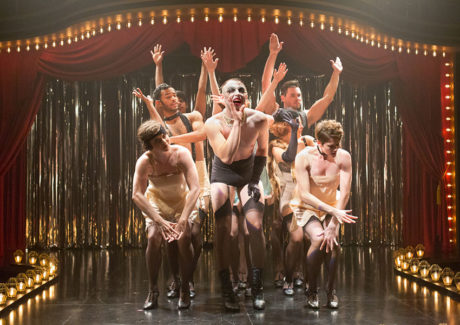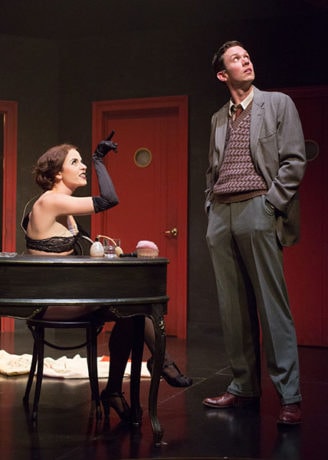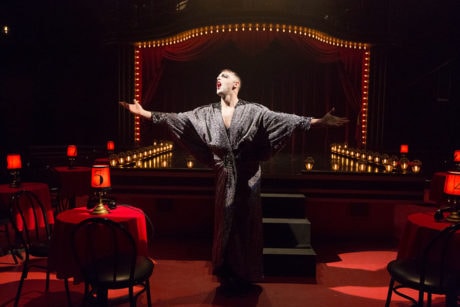“Why do we continue to allow destructive powers to gain control?” – Matthew Decker, Director of Cabaret
This is the question that runs through Arden Theatre Company’s production of the musical Cabaret. At first this sentiment only simmers under the playfully erotic dances and jokes, until the Act One finale, “Tomorrow Belongs to Me.” Suddenly, the show’s setting – Germany between the world wars – becomes a crucial factor in the story. The story’s Nazi undercurrents become alarmingly palpable. The fun-filled, over-the-top antics came to an abrupt halt and I was thrust into the seriousness of that time — yet I was no longer able to escape the shadow of today’s political climate.

The Arden’s production of Cabaret is top-notch, although audiences should not expect to leave the theatre uplifted. Cabaret – with its classic John Kander/Fred Ebb songs and its masterful book by Joe Masteroff, based on a play by John Van Druten and stories by Christopher Isherwood – explores the gritty, dangerous world of Germany during the rise of the Nazi Party. It’s set in the cabaret culture of the era, which teemed with underground sexuality and a demi-monde existence that would later be eradicated by the Nazis. Contrastingly, the sweet romance of the middle-aged neighbors Herr Schultz and Fräulein Schneider provides some hope that even later in life people can fall in love and be happy.
The Arden has been transformed into the “Kit Kat Club” by David P. Gordon (scene design), Maria Shaplin (lighting design) and Jorge Cousineau (sound design). The set, lighting and sound meld expertly, along with costume design by Olivera Gajic, to create the world of a 1929 German cabaret. Fräulein Schneider’s boardinghouse and a railway car are also depicted seamlessly on the Kit Kat stage.
Matthew Decker’s immersive staging makes the audience an intergral part of the show. Small tables and spotlights surround the stage, and actors perform and enter from various parts of the house (audience seating). The stage has two levels. On the top level, reached by a spiral staircase, the orchestra, skillfully directed by Alex Bechtel, plays with gusto. Actors also emote from the top level, making the entire hall part of the action.

This makes for an exceptionally intense theatrical experience. At times actors interact directly and spontaneously with patrons. This discourages sitting passively in your seat and watching, which is one of the reasons Cabaret is so powerful — it forces audience engagement and participation.
Another reason for this depth is the incredible cast. As the Emcee, John Jarboe commands the entire theater with captivating presence and precision. Up until the very end he is in control. His effortless singing is enchanting and his speech is at times comforting. His “Willkommen” is a tad sinister and his impromptu interactions with the audience are both comical and grotesque. Other characters are inherently lovable, like Herr Schultz (Kenny Morris) and Fräulein Schneider (Mary Elizabeth Scallen). I found both to be quite convincing, with appropriate accents and mannerisms, and poignant singing in “It Couldn’t Please Me More” and “Married.” Scallen’s deep contralto stood out in “What Would You Do?”
Sally Bowles, the English nightclub singer whose journey to Berlin sets the plot in motion, was less likable as a person but well-played by Charissa Hogeland. Hogeland bounced back and forth between bright-eyed youth and world-weary cynicism, both in her relationship with Cliff (Daniel Fredrick) and in her musical numbers. Sally is a rather complex character, and Hogeland does her justice; I felt her passion and anguish in her rendition of the show’s title song. Fredrick was refreshing and transparent as Cliff, in contrast to Christopher Patrick Mullen’s shady Ernst. Suli Holum never missed a beat in providing some comic relief as Fräulein Kost.
Overall, I was impressed with the ensemble’s singing and dancing. The cast performed in European cabaret style (and did not sound American), which further situated this period musical. Jenn Rose’s choreography was appropriately scandalous and well-executed.
Cabaret at the Arden is a must-see for adults who enjoy musical theatre, both for its superb production values and its thought-provoking political commentary. There will be post-show discussions on October 5, 8, 11, 15 and 18. I am tempted to see it again just so that I can participate in a discussion afterwards!
Expect to be dazzled AND disturbed by the Arden’s Cabaret.
Running Time: Two hours and 20 minutes, including intermission.

Cabaret plays through October 22, 2017 at Arden Theatre Company – 40 North Second Street, in Philadelphia, PA. For tickets, call the box office at (215) 922-1122, or purchase them online.




